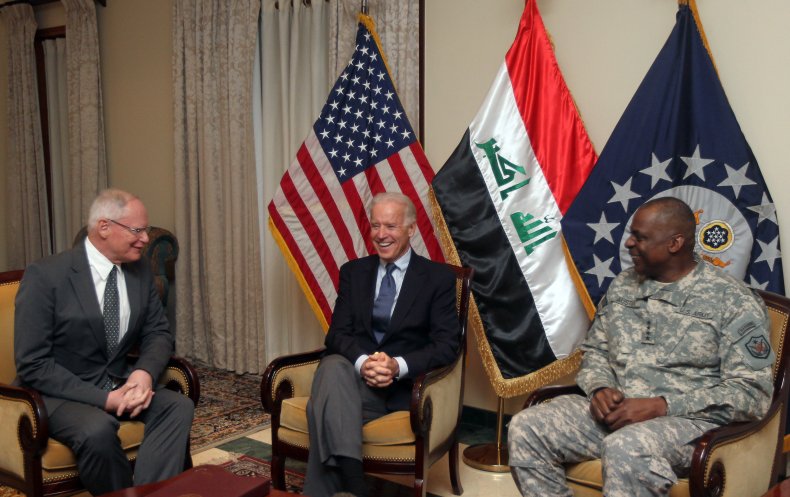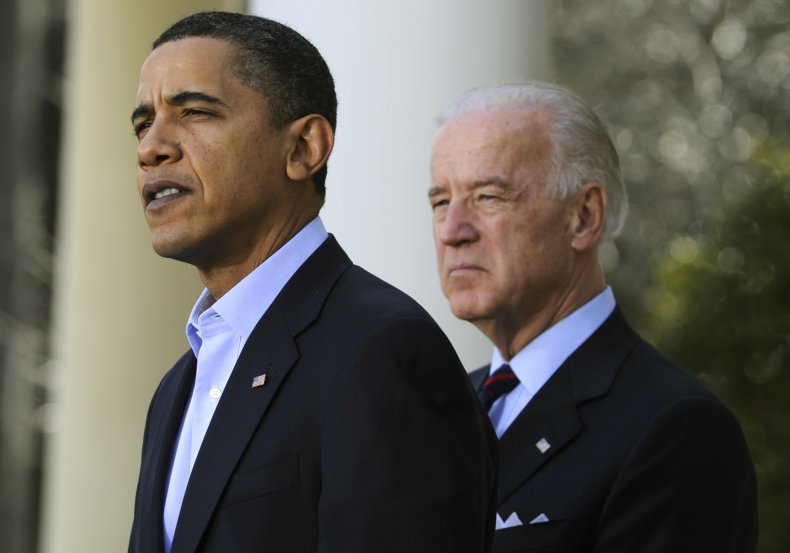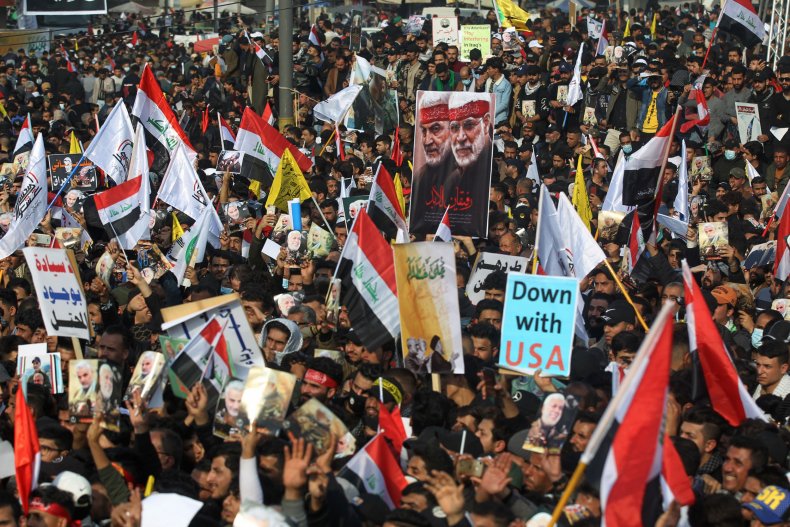BY TOM O'CONNOR
As President Joe Biden becomes the fourth consecutive U.S. president to assume the mantle of wartime leadership in the Middle East, his foreign policy decisions inevitably are viewed in relation to those of his predecessors—and none so much as those of the man to whom he once reported, former President Barack Obama.
In perhaps no country is this more clear than in Iraq, where U.S. troops remain, albeit in smaller numbers, despite Obama's announcement of a full withdrawal nearly a decade ago amid a collapse in discussions with the Iraqi government at the time.
Some observers point to this decision as a misstep that paved the way for the rise of the Islamic State militant group (ISIS). Others refute that theory, instead blaming domestic forces at work in Iraq. One thing is certain, however: The 46th president is aiming to assert his own unique strategy in an attempt to distance himself from past approaches.
Veteran U.S. diplomat James Jeffrey, who served as both Obama's ambassador to Iraq and former President Donald Trump's special envoy for Syria and the anti-ISIS coalition, laid out what he saw as differences in the mindset of Biden, whom he described as "more a mainstream late-20th century foreign policy moderate than Obama."
In some ways, he said, this involves a less compromising approach than that of his former boss, a number of whose deputies have joined the new administration in new roles.
"Biden doesn't nurse suspicion that the U.S. is responsible for or contribute to world security problems, but rather sees the U.S. as the remedy," Jeffrey told Newsweek, citing examples of Obama's diplomacy with Iran and Cuba.
But at the end of the day, he argued, even a tougher stance from Biden ultimately means less among an international community that no longer places the U.S. at its center.
"The world has moved on beyond Biden's core views," Jeffrey said. "The U.S. is no longer the 'indispensable nation,' and intervention by the U.S. in countries' inner politics to promote American values is problematic and typically a failure."
 Then-U.S. Vice President Joe Biden meets with U.S. ambassador James Jeffrey (L) and General Lloyd Austin, then the commander of United States Forces - Iraq (USF-I) and today President Biden's Pentagon chief, at the U.S. embassy upon arrival at Baghdad on a surprise visit on November 29, 2011, as U.S. troops departed Iraq ahead of a year-end deadline.AHMAD AL-RUBAYE/AFP/GETTY IMAGES
Then-U.S. Vice President Joe Biden meets with U.S. ambassador James Jeffrey (L) and General Lloyd Austin, then the commander of United States Forces - Iraq (USF-I) and today President Biden's Pentagon chief, at the U.S. embassy upon arrival at Baghdad on a surprise visit on November 29, 2011, as U.S. troops departed Iraq ahead of a year-end deadline.AHMAD AL-RUBAYE/AFP/GETTY IMAGESThe U.S. attempt to institute democracy in Iraq began with a thunderous roar nearly 18 years ago as Baghdad, already under siege by Washington's sanctions, was bombarded by U.S. missiles in 2003. In less than a month's time, former President George W. Bush would deliver a victory speech in front of a banner that read "Mission Accomplished."
What exactly that mission was remains unclear to this day. The alleged weapons of mass destruction held by deposed leader Saddam Hussein were never uncovered, and the suspected links to Al-Qaeda were never proven, undermining the two key justifications for the U.S.-led assault. The war that it started continues in one form or another to this day.
In that period of time, Biden has gone from senator to vice president to commander-in-chief. He demonstrated his latest authorities on Thursday when he ordered airstrikes on eastern Syria positions allegedly held by militias supportive of Iran. They were launched in response to a recent yet still unclaimed rocket attack that killed a contractor and injured another, while also wounding a U.S. soldier in Iraq's northern city of Erbil, capital of the Kurdistan region.
On its face, the move mirrored the red line set by Trump, who bombed not only Syrian but Iraqi positions in response to such rocket attacks. Jeffrey said that "there may be little difference in practice between Trump and Biden, but some in tone."
He warned that the widespread criticism of the Trump administration "makes the new team think the job easy—just don't be Trump, just embrace 'diplomacy' and 'be at the table.'"
But the former U.S. ambassador defended many of Trump's actions across the globe, including against Iran, and said "Biden's strike on February 25 in Syria against Iranian proxies suggests the new team is learning this lesson."
The Trump administration's 2018 withdrawal from a 2015 nuclear deal forged with major world powers under Obama—when Biden was vice president—was accompanied by a spike in unrest in Iraq, where both U.S. and Iranian assets were deployed to fight ISIS. Faced with no overarching mutual enemy and their own geopolitical rivalry, the two powers turned on one another, creating a new battle in Iraq.
Iraqi ambassador to the U.S. Fareed Yasseen hopes this history doesn't repeat itself.
Could Biden Trigger An All-Out Conflict in Afghanistan?
"In terms of our relations with the United States, reality prevails," Yasseen told Newsweek. "All of the previous administrations had to revise their policies towards Iraq in order to take reality into account, whether the surge for the Bush administration or the setting up of the anti-ISIS coalition to defeat ISIS for the Obama administration, or the travel ban imposed on Iraqis by the Trump administration."
When it comes to the latest man to lead the White House, Yasseen sees positive signs so far.
"The Biden administration includes people who have dealt closely with Iraq, who know the issues and the players," Yasseen told Newsweek. "They deal with Iraq as Iraq, not through other prisms. They know what resources in blood and treasure the United States has expended in Iraq, and they want this to count for something by helping Iraq succeed."
This could be seen even in the recent strikes in neighboring Syria, a country where the Obama administration backed an insurgency later overtaken by Islamists who would go on to feed ISIS' rise both there and in Iraq in the wake of the U.S. exit.
The Trump administration also bombed forces it believed were linked to Iran, and did so in both Syria and in Iraq, but it managed to draw the ire of Iraqis in doing so.
"The response of the [Biden] administration, at the least, showed greater respect for Iraqi sovereignty than the previous administration in that the retaliatory strike did not occur on Iraqi territory," Yasseen said.
Pentagon spokesperson John Kirby described the strikes as "proportionate," echoing a term used over a year ago by Iranian Foreign Minister Mohammad Javad Zarif in describing the Iranian missile salvo that rocked U.S. positions in response to the January 2020 killing of Iran's elite Revolutionary Guard Quds Force commander Major General Qassem Soleimani at Baghdad International Airport.
Among others, the attack also killed Iraq's Popular Mobilization Forces deputy chief Abu Mahdi al-Muhandis, and it sparked nationwide antipathy toward the U.S., which certain political forces, especially but not exclusively those with ties to Iran, increasingly began to view as an occupying power.
But with new leadership in Washington, Yasseen said he hoped that the U.S. would expand upon its relationship with Iraq, enabling a shift of focus from defense to areas of bilateral concern, including efforts to address another lurking threat—climate change.
"At some point, our relationship will normalize and we will shift from a focus on security to a focus on all the other dimensions covered in our Strategic Framework Agreement: economic development, education, the all-important health issue we're dealing with today, not to mention the environment," Yasseen said.
"One of the areas I am really eager to promote is an effective partnership to address climate change," he said, "an issue we are beginning to feel acutely in Iraq."
Yasseen said the lingering U.S. military presence in his country would gradually lighten as the train, advise and assist mission passed on the necessary capabilities to the Iraqi armed forces.
And he claimed great progress has been made.
"U.S. troops and more broadly the coalition's are there to support Iraq's security forces to ensure the ultimate defeat of ISIS," Yasseen said. "We have achieved huge progress, and at this point all combat operations are carried out by Iraqi forces. But there are still capabilities we do not master and which the U.S. are helping us with, at some point, hopefully sooner rather than later."
 U.S. President Barack Obama makes a statement regarding the Iraqi parliamentary elections, as then-Vice President Joe Biden listens, in the Rose Garden of the White House March 7, 2010 in Washington, D.C.MIKE THEILER-POOL//AFP/GETTY IMAGES
U.S. President Barack Obama makes a statement regarding the Iraqi parliamentary elections, as then-Vice President Joe Biden listens, in the Rose Garden of the White House March 7, 2010 in Washington, D.C.MIKE THEILER-POOL//AFP/GETTY IMAGESDaniel Davis, a retired U.S. Army colonel with more than two decades of service, including multiple tours in Iraq and Afghanistan, said the absence of set dates left open the possibility of indefinitely extending the so-called "forever wars" the Biden administration—like that of Trump before him—claimed to loathe.
"You can't do that mission with 2,500 people, you couldn't do it with double that," Davis, senior fellow and military expert at the Defense Priorities think tank, told Newsweek. "I served as an Iraqi military trainer, so I know what can and can't be done with that number of troops, and you can't effectively train a foreign army with so few troops."
He argued that the time to withdraw forces is now.
"There are no American security interests at stake in Iraq, period, and there's no valid military mission," Davis said. "There are no valid, militarily attainable objectives the military is even attempting to perform, ergo, there is no standard by which they would ever leave. So they need to just get out of there, because they're not helping our country and we endure a premium cost in the process."
He disputed the oft-cited argument that Obama essentially allowed ISIS to rise with his withdrawal, noting that it was the Iraqi government's refusal at the time to extend the stay of U.S. troops. He faulted Obama not for leaving, but for returning.
"The real question is why did we even go back, because we should have let Iraq and Syria handle this. That was their problem," Davis said. "They're the ones that had the biggest threat, all we need to do is protect American interests, and we could have continued to ensure our security without having put one boot on the ground in Iraq or Syria."
In Iraq, it was actually Iran that responded first to the rise of ISIS. Tehran, alongside influential cleric Grand Ayatollah Ali al-Sistani—who is set to meet Pope Francis in Iraq next month—together bolstered the Popular Mobilization Forces. The slain Soleimani and Muhandis were at the forefront of this fight.
"Obama took his time to respond, while Iran didn't," Ruba Ali al-Hassani, a fellow at the Tahrir Institute for Middle East Policy, told Newsweek. "Till this day, this expedient and heavy support from Iran during the war on ISIS provided Iran and its supporters with further legitimacy. They can claim that Iran has been Iraq's greatest ally in the war on ISIS, which is not factually wrong."
In a statement sent to Newsweek, a State Department spokesperson suggested that the approach of the Biden administration would not preclude positive ties between Baghdad and Tehran, but at the same time, it would remain vigilant on forces believed to be backed by Iran that were acting outside of Iraqi law.
"While we encourage Iraq to maintain friendly, productive relations with all its neighbors, we remain concerned about Iranian influence that undermines Iraqi stability and the integrity of state institutions," the spokesperson said. "Our diplomatic approach seeks to dissuade Iran from funding and arming groups outside the control of governments around the region, including Iraq."
U.S. 'War on Terror' Covered Near Half the World in Past 3 Years, Map Shows
The Biden administration's more delicate tone, however, has yet to translate to change on the ground, where U.S. troops remain a central point of contention.
"The U.S.-Iran proxy war in Iraq has since been legitimized by each party which claims to 'resist' or fight the other's presence in the country," Hassani said. "Iran-supported armed groups claim to be the "axis of resistance," and U.S. presence legitimizes their rhetoric. In order to motivate them to back down, there must be a soft approach that includes both negotiation and de-escalation."
She viewed the latest U.S. strikes in Syria as "an escalation" that could potentially trigger a response, fueling the vicious circle seen in past years. Rather than pursue an interventionist approach that she noted helped lead to the rise of extremist forces in the first place, she recommended Biden empower Iraqi civil society and, echoing Yasseen, expand on the Strategic Forces Agreement.
"The Biden administration can use its role to advocate for human rights in Iraq, and address issues such as enforced disappearances, threats against free speech, violence against protestors and activists, etc.," Hassani said. "This is an opportunity for the U.S. to change its method in Iraq, because its past approaches have not been working."
Lahib Higel, senior Iraq analyst at the International Crisis Group, also called for an Iraq strategy that prioritized Iraq itself, not the greater geopolitical struggle with Iran and its partners.
"Irrespective of its Iran policy, the U.S. should develop an Iraq policy," Higel told Newsweek. "Iran-linked armed groups in Iraq do not only exist to react to U.S.-Iran tensions. They are deeply entangled with the state and have through the war against ISIS established a presence throughout the country that serves their own interests, not only Iran's."
While taking a tough line against Iran and allied forces might appease conservatives at home recalling the fallout of the Obama era, engaging with Iran today could serve as a win-win-win.
 Iraqi demonstrators lift flags and placards as they rally in Tahrir square in the capital Baghdad on January 3, to mark one year after a U.S. drone strike killed Iran's revered commander Qasem Soleimani and his Iraqi lieutenant Abu Mahdi al-Muhandis near the capital. Thousands of Iraqi mourners chanted "revenge" and "no to America", one year after the U.S. strike which killed Soleimani and Muhandis and brought Washington and Tehran to the brink of war in early 2020, an anniversary that was also marked in recent days across Iran and by supporters in Syria, Lebanon, Yemen and elsewhere.AHMAD AL-RUBAYE/AFP/GETTY IMAGES
Iraqi demonstrators lift flags and placards as they rally in Tahrir square in the capital Baghdad on January 3, to mark one year after a U.S. drone strike killed Iran's revered commander Qasem Soleimani and his Iraqi lieutenant Abu Mahdi al-Muhandis near the capital. Thousands of Iraqi mourners chanted "revenge" and "no to America", one year after the U.S. strike which killed Soleimani and Muhandis and brought Washington and Tehran to the brink of war in early 2020, an anniversary that was also marked in recent days across Iran and by supporters in Syria, Lebanon, Yemen and elsewhere.AHMAD AL-RUBAYE/AFP/GETTY IMAGESAbbas Kadhim, head of the Atlantic Council think tank's Iraq Initiative, who previously held a senior government affairs position at the Iraqi embassy in Washington, sees the diplomatic approach to Tehran as best for both powers, as well as Baghdad, which has suffered from the actions of both governments.
"The Iranians are balancing," Kadhim told Newsweek. "They know that the Iraqi government is unhappy with their proxies' action, but for them, the results that come out of the proxy action outweigh the alienation of the Iraqi government."
He said Iran's position in Iraq is delicate and subject to change.
"But if there is nothing to get out of these actions," Kadhim said, "all that they have from proxy action will be alienating the Iraqi government and no benefits to talk about, then Iran will not need that."
But ultimately he too emphasized the need to focus on Iraq as a sovereign entity and issued three potential positions for the Biden administration toward Iraq.
The first is the "outdated approach" of federalism that would essentially divide Iraq as envisioned by Biden the senator, the second is a totally militarily hands-off approach ultimately realized during his time as vice president under Obama with the result being still lingering chaos for Iraq, and the third being a total rethinking—Kadhim's preferred strategy.
"The third approach is really going to the drawing board and designing a fresh policy towards Iraq, a policy that takes into account the current facts on the ground, the current political realities in Iraq, and also drafts specific goals and an endgame for the United States foreign policy," Kadhim said. "And that is something I think would be advisable for the administration, if they want to accomplish any success in U.S.-Iraq relations. It is doable, all what we need is the will and the right people to do it."
In the end, he said it was on Biden to forge a new path ahead.
"I think much of what is needed is to have a common-sense policy towards Iraq," Kadhim said, "to think out of the box, to divorce the future policy from the current and old policies that proved to be completely bankrupt."
No comments:
Post a Comment